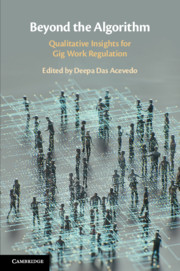'Even approximately a decade into the modern ‘gig economy,’ many of us are still trying to grasp the basic contours of this phenomenon. Beyond the Algorithm takes us to the next level of understanding. What we can take away from its multidisciplinary approach is a more richly textured appreciation of how the nature of work is changing.'
Sharon Block - Harvard Law School
'This superb collection provides an exceptionally rich and multifaceted treatment of gig work. Each chapter makes a focused contribution, yet together they range from driving to carework, from tax compliance to contract theory, from data access to media discourse. A must-read for empirically-grounded policymaking and legally-informed qualitative research.'
Noah D. Zatz - UCLA School of Law
‘… Beyond the Algorithm provides a valuable supplement to what is known about the plights facing gig workers … a useful resource for ethnographers who want to understand the economic, regulatory, and ethical challenges facing today’s gig laborers and to play a part in the development of policies and laws that address them.’
Emanuela Guano
Source: Society for the Anthropology of Work
‘… this book does succeed in providing creative, rigorous, valuable and important empirical insights through its thought-provoking combination of empirical and legal analyses by academics and observers or participants in the gig economy. The book is written in an understandable manner and is very informative, comprehensive and of high quality, enriching the discussion on gig economy. The book is particularly relevant for researchers, social partners and policymakers that are seeking comparative information, but is recommended also to a wider range of readers, interested in understanding a bit about the work lives of the people who comprise the gig economy in the US.’
Primož Rataj
Source: European Journal of Social Security
‘… this book will provide many valuable insights and points of departure for future research … the book draws upon a diverse range of contributors from the disciplines of law and sociology in addition to non-academic gig economy experts from nonprofits and the media.’
Alex Wood
Source: ILR Review



